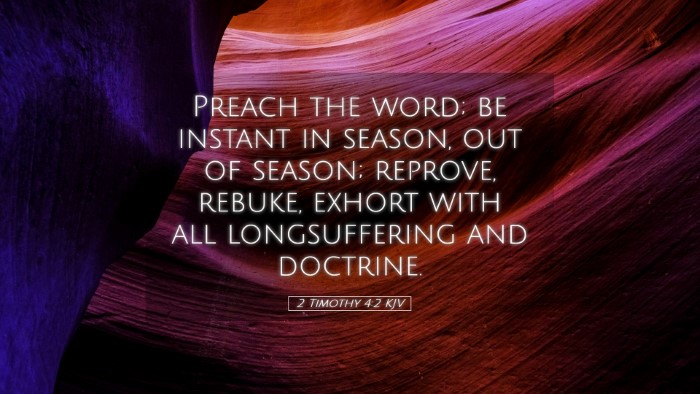Commentary on 2 Timothy 4:2
Verse: "Preach the word; be instant in season, out of season; reprove, rebuke, exhort with all longsuffering and doctrine."
This verse forms a crucial part of the Apostle Paul's final exhortations to Timothy, emphasizing the importance of the ministry of the Word and the responsibilities that come with it.
1. The Imperative of Preaching
“Preach the word” signifies more than mere verbal proclamation; it emphasizes the necessity of delivering scripture faithfully. According to Matthew Henry, this command is a foundational duty of every minister, reflecting the priority of God’s Word in Christian life.
Henry notes that preaching includes explaining, enforcing, and applying the Scriptures, urging the spiritual discernment required to convey biblical truths effectively. Albert Barnes adds that this call is not only directed to Timothy but extends to all who handle the sacred text, calling for a diligent and earnest commitment to rightly divide the Word of truth.
2. The Call to be Instant
The phrase “be instant” (or “be prepared”) is crucial for understanding pastoral duties. Adam Clarke elucidates that this means to be ready at all times and under all circumstances to preach the Word. Whether convenient or not, whether in favor or at odds with popular opinion, the preacher must stand firm. This indicates a life devoted not only to study but also to readiness in spiritual warfare.
This concept of being instant “in season, out of season” symbolizes the perennial need for proclaiming the Gospel, as Barnes insists that the preacher’s duty transcends societal reception. Challenges and opposition are inevitable, and the genuine preacher remains undeterred.
3. The Essential Elements of Preaching
Paul continues with essential attributes of preaching: “reprove, rebuke, exhort”. These three components are interrelated yet distinctive:
- Reprove: This involves an authoritative declaration of error and sin, challenging believers to recognize and turn from their wayward paths. Henry emphasizes that reproving should be done with a spirit of love and humility.
- Rebuke: While reproof addresses errors more broadly, rebuke is often more direct and sharp. Clarke notes that rebuke should convey the urgency of repentance and restoration, aligning with the broader pastoral responsibility of overseeing the spiritual health of the congregation.
- Exhort: This element requires rallying and encouraging believers, offering comfort and motivation towards righteousness. Here, Henry points out that exhortation strengthens the weak and supports those striving in faith.
4. The Attitude of the Minister
The characteristics of preaching are to be accompanied by “longsuffering” and “doctrine”. Paul emphasizes patience, suggesting that preaching may often involve enduring frustrations and setbacks. Barnes articulates that longsuffering reflects the nature of Christ in the minister, preparing the preacher for long-term commitment despite the hard-heartedness of hearers.
Meanwhile, Clarke asserts that the doctrine imparted should be sound, reflecting the teachings of Jesus and the apostles, embodying orthodoxy to combat the allegiances to false teachings that infiltrate the church.
5. The Broader Context of Apostasy and Verification
This command comes at a time when Paul warns of an impending apostasy, urging Timothy to hold fast to the truth. The need for bold and uncompromising preaching is underscored in the face of an audience that may turn away from sound doctrine to embrace fables (2 Timothy 4:3-4). Henry suggests that this prophetic warning about the state of the church necessitates a counteraction through steadfast preaching.
In light of this, the focus shifts to instructional faithfulness. Barnes argues that the authority of Scripture must remain at the forefront of preaching, resisting the temptation to yield to popular culture that often leads congregations astray. Preachers are thus tasked to elevate the Word as the foundational guide for life and conduct.
6. Conclusion: The Call to Faithful Ministry
In sum, Paul’s exhortation in 2 Timothy 4:2 encapsulates the heart of pastoral ministry. The act of preaching is a holy vocation demanding vigilance, preparation, and profound obedience to God's calling. Clarke reflects on the weight of this responsibility, encouraging ministers to be aware of the eternal consequences of their discourse.
Through a synthesis of reproof, rebuke, and exhortation, coupled with patience and adherence to sound doctrine, the minister can effectively shepherd their flock, remaining faithful amid challenges we face in contemporary contexts. This exhortation remains relevant, inspiring enduring commitment to the truth of the Gospel in all circumstances.


